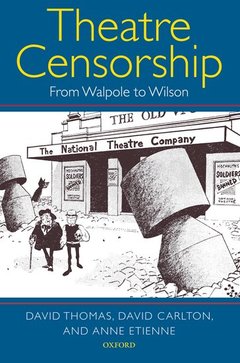Theatre Censorship From Walpole to Wilson
Langue : Anglais
Auteurs : Thomas David, Carlton David, Etienne Anne

Using previously unpublished material from the National Archives, David Thomas, David Carlton, and Anne Etienne provide a new perspective on British cultural history. Statutory censorship was first introduced in Britain by Sir Robert Walpole with his Licensing Act of 1737. Previously theatre censorship was exercised under the Royal Prerogative. By giving the Lord Chamberlain statutory powers of theatre censorship, Walpole ensured that confusion over the relationship between the Royal Prerogative and statute law would prevent any serious challenge to theatre censorship in Parliament until the twentieth century. The authors place theatre censorship legislation and its attempted reform in their wider political context. Sections outlining the political history of key periods explain why theatre censorship legislation was introduced in 1737, why attempts to reform the legislation failed in 1832, 1909, and 1949, and finally succeeded in 1968. Opposition from Edward VII helped to prevent the abolition of theatre censorship in 1909. In 1968, theatre censorship was abolished despite opposition from Elizabeth II, Lord Cobbold (her Lord Chamberlain) and Harold Wilson (her Prime Minister). There was strong support for theatre censorship on the part of commercial theatre managers who saw censorship as offering protection from vexatious prosecution. A policy of inertia and deliberate obfuscation on the part of Home Office officials helped to prevent the abolition of theatre censorship legislation until 1968. It was only when playwrights, directors, critics, audiences, and politicians (notably Roy Jenkins) applied combined pressure that theatre censorship was finally abolished. The volume concludes by exploring whether new forms of covert censorship have replaced the statutory theatre censorship abolished with the 1968 Theatres Act.
Timeline. Statutory Theatre Censorship. 1. Theatre Censorship under the Royal Prerogative. 2. Statutory Theatre Censorship: 1737-1892. 3. The 1909 Challenge to Statutory Theatre Censorship. 4. The Inter-War Years. 5. The 1949 Bid to end Statutory Theatre Censorship. 6. Further Attempts to end Statutory Theatre Censorship. 7. The 1960s and the 1968 Theatres Act. 8. The Aftermath: British Theatre following the Abolition of Statutory Censorship. Conclusion.
David Thomas was appointed to a Lectureship in Drama at the University of Bristol in 1966. While at Bristol he directed plays, workshops and operas from a wide variety of periods. His research at Bristol was primarily concerned with Scandinavian theatre from the 18th to the 20th century. He published essays in Ibsenårbok, and chapters in various jointly authored volumes, as well as a monograph on Ibsen. In 1986 he was appointed Professor and Chairman of Theatre Studies at the University of Warwick. While at Warwick he published a Documentary History of Restoration and Georgian Theatre, collections of plays, a monograph on Congreve, contributions to The Oxford Encyclopedia of Theatre and Performance, and a video on Restoration playhouses. He has contributed to various radio and television programmes. He is now a Professor Emeritus of the University of Warwick. David Carlton served for seventeen years as a Lecturer and a Senior Lecturer in International Studies at the University of Warwick. He previously held similar positions at what is now the London Metropolitan University and at the Open University. He is author of five monographs on a range of topics involving British politics in the twentieth century and the West's response to terrorism he is also co-editor of a further twenty-one volumes. His best-known book is Anthony Eden: A Biography. He has published widely in various academic journals and his journalistic work has been published in The Times; The Telegraph; The Spectator and The Listener. He has also appeared on various radio and television programmes including the BBC's Newsnight and Radio Free Europe. Anne Etienne taught courses in English literature and drama at Orléans from 1994 to 2000. Her research has since been focused on 20th-century censorship. In 2001 she was appointed to a Leverhulme-funded Research Fellowship at the University of Warwick to undertake archival and empirical research for the current volume. She has published articles on theatre
a highly commendable piece of scholarship wide readership: theatre historians and scholars, and all students and general readers inquisitive about the political context of theatre censorship.
Date de parution : 11-2007
Ouvrage de 300 p.
16.5x24.2 cm
© 2024 LAVOISIER S.A.S.



